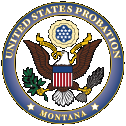As a result of the Mandatory Victims Restitution Act of 1996, all payments for special assessment, fines and restitution are receipted by the U.S. District Court clerk's office. The applicable interest rates, penalties, etc. are based on the offense date and the applicable statute in effect. Payments should be mailed or presented in person to the cashier at your local U.S. District Court office. Checks should be payable to Clerk, U.S. District Court.
Special assessment, fine and restitution when imposed are ordered on the J & C (Judgment in a criminal case) at sentencing. All monetary penalties are recorded by the clerk's office as documented in the J & C. Special assessment is usually determined per count and payment is due immediately to the court. Fine and restitution is also generally due immediately, however, the judge often allows monthly payments when large amounts are involved. The fine and/or restitution is due based on the applicable statute and interest is accrued even if a payment schedule has been established once the interest start date has passed. Adherence to a payment schedule stops the imposition of the applicable penalties, delinquency and default provisions.
Application of Payments
Generally, payments are applied to outstanding debts in the following order: 1) special assessment; 2) non-federal restitution; 3) federal restitution; and 4) fine. Within each category, payments are applied in the order of principal, costs, interest and penalties.
Interest assessed is computed using the simple interest method. Interest is generally not compounded. You may contact the U.S. District Court Clerk's Office to inquire on the status of the payments in a particular case. The U.S. Attorney's office also sends statement with payment coupons to the defendants on a monthly basis.
The U.S. Attorney is responsible for collection and enforcement of special assessments, fine and restitution ordered by the court. The Financial Litigation Unit of the U.S. Attorney's office monitors the status of payments and will take action as appropriate.
Restitution Payments to Victims
Victims are generally contacted by the U.S. Attorney's office after sentencing and informed of any restitution that has been ordered. They are advised on the process and what they should expect to receive. All moneys received from the defendant for restitution are paid to the victim(s) according to the J & C. There is a standard waiting period of at least two weeks to assure that all payments have cleared through the Federal Reserve before the payment to the victims are processed. Payments are normally paid proportionally to each victim unless specified in the J & C. Restitution payments are made once a month, sometime during the last week of the month.
Case by Case Situations
The information presented on this Fines and Restitution Payments is general information that applies to all cases. However, deviations may be allowed on a case by case basis. The judge may specify additional requirements or waive certain items if warranted in a particular case. You may wish to verify detailed information regarding your case with the court.
